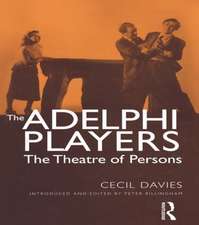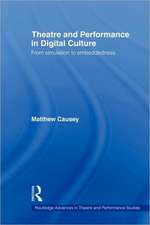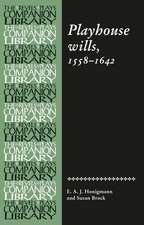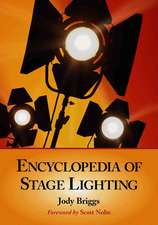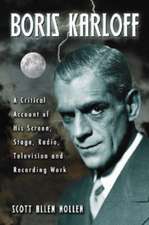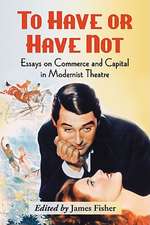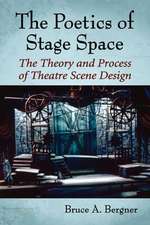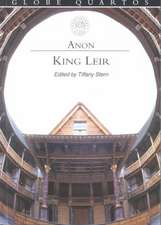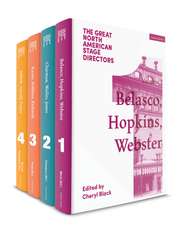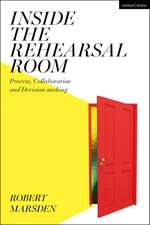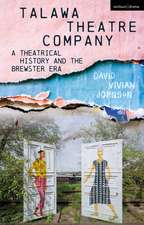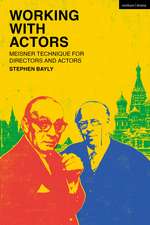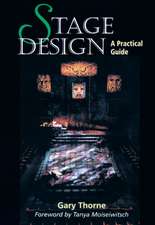Theatre of Exile
Autor Horacio Czertok Editat de Martin Holbraad Traducere de Robert Ellioten Limba Engleză Hardback – 4 aug 2015
Providing Czertok’s own, highly personal account of his trajectory in the global scene of theatre-making over the past half-century, this is a book about the theatre of exile – a theatre of streets, prisons, hospitals, open to direct and unexpected encounters with audiences and their life-experiences.
Photos by Luca Gavagna
Preț: 999.46 lei
Preț vechi: 1218.86 lei
-18% Nou
Puncte Express: 1499
Preț estimativ în valută:
191.29€ • 198.93$ • 160.07£
191.29€ • 198.93$ • 160.07£
Carte tipărită la comandă
Livrare economică 14-28 martie
Preluare comenzi: 021 569.72.76
Specificații
ISBN-13: 9781138887084
ISBN-10: 1138887080
Pagini: 164
Dimensiuni: 156 x 234 x 15 mm
Greutate: 0.43 kg
Ediția:1
Editura: Taylor & Francis
Colecția Routledge
Locul publicării:Oxford, United Kingdom
ISBN-10: 1138887080
Pagini: 164
Dimensiuni: 156 x 234 x 15 mm
Greutate: 0.43 kg
Ediția:1
Editura: Taylor & Francis
Colecția Routledge
Locul publicării:Oxford, United Kingdom
Cuprins
List of illustrations
Foreword
Introductory note
Preface - Fahrenheit revisited
PART I – THEATRE IN OPEN SPACES
A new beginning
Ferrara: meeting Antonio Slavich
Pedagogy and theatre practice: the group
The school of the street
Parallel lives
A dramaturgy for street theatre
From the character to the theme
The non-audience of street theatre
From non-audience to audience
Time robbers
A Prussian General at the service of the theatrical arts
Strategy and moral strength
Boldness
Perseverance
Surprise
Stratagem
Concentration of forces in a space
Knowing the terrain
Communications systems
The street as a theatrical place
From the city to the touring village: Mir Caravane
Quijote!
Emigration and theatre
PART II – THE EDGE OF THE COIN
The third side
Theatre workshop and techniques
The reasons of the heart
Pleasure and creativity
Theatre and mental health
The shaman in the university
Theatre in prison: dignity restored
Reading the body like a book
The actor: a professional liar?
Teacher and pupil – a drama in many acts
The humility of the miner
The art of observing
Observations on observation
Baudelaire's "pilot"
On the language of the gesture
Gesture and mask
Organic gesture real gesture
The invisible gesture
Theatre and magic
A look at primordial stupidities
Other ways of seeing
Magic and everyday life
"God laughed,
The voice of the wolf
Fire
PART III – THE METHOD OF EXILE
Theatre, storytelling and experience
Conflict as a an investigative technique
From the everyday to the out-of-the-everyday
The legend of the Method
From legend to practice: the improvisation exercise
Exercise preparation plan
From Maria's working diary
Individual preparation
Working with images
The role of remembrance
Relationships
The social relationship
The emotional relationship
The ethical-philosophical relationship
The environmental relationship
The motives: the becauses
Characteristics of the request
What a because is
The secret reason, or the chameleon strategy
The reasons for the becauses
The urgency in the becauses
The curtain
The situation: The need for surprise
The dynamic of the exercise
The activity
Attention and concentration: being or doing
The ten commandments of the activity
The reason for coming
The costume
The mood
Conditions of the mood
The doing of the exercise
Rules and aims of the game
The criticism of the exercise
The practice – some examples
The subconscious and character
Epilogue
Foreword
Introductory note
Preface - Fahrenheit revisited
PART I – THEATRE IN OPEN SPACES
A new beginning
Ferrara: meeting Antonio Slavich
Pedagogy and theatre practice: the group
The school of the street
Parallel lives
A dramaturgy for street theatre
From the character to the theme
The non-audience of street theatre
From non-audience to audience
Time robbers
A Prussian General at the service of the theatrical arts
Strategy and moral strength
Boldness
Perseverance
Surprise
Stratagem
Concentration of forces in a space
Knowing the terrain
Communications systems
The street as a theatrical place
From the city to the touring village: Mir Caravane
Quijote!
Emigration and theatre
PART II – THE EDGE OF THE COIN
The third side
Theatre workshop and techniques
The reasons of the heart
Pleasure and creativity
Theatre and mental health
The shaman in the university
Theatre in prison: dignity restored
Reading the body like a book
The actor: a professional liar?
Teacher and pupil – a drama in many acts
The humility of the miner
The art of observing
Observations on observation
Baudelaire's "pilot"
On the language of the gesture
Gesture and mask
Organic gesture real gesture
The invisible gesture
Theatre and magic
A look at primordial stupidities
Other ways of seeing
Magic and everyday life
"God laughed,
The voice of the wolf
Fire
PART III – THE METHOD OF EXILE
Theatre, storytelling and experience
Conflict as a an investigative technique
From the everyday to the out-of-the-everyday
The legend of the Method
From legend to practice: the improvisation exercise
Exercise preparation plan
From Maria's working diary
Individual preparation
Working with images
The role of remembrance
Relationships
The social relationship
The emotional relationship
The ethical-philosophical relationship
The environmental relationship
The motives: the becauses
Characteristics of the request
What a because is
The secret reason, or the chameleon strategy
The reasons for the becauses
The urgency in the becauses
The curtain
The situation: The need for surprise
The dynamic of the exercise
The activity
Attention and concentration: being or doing
The ten commandments of the activity
The reason for coming
The costume
The mood
Conditions of the mood
The doing of the exercise
Rules and aims of the game
The criticism of the exercise
The practice – some examples
The subconscious and character
Epilogue
Notă biografică
Horacio Czertok teaches theatre animation at the University of Ferrara., Martin Holbraad is Reader in Social Anthropology at UCL.
Descriere
Providing Czertok’s own, highly personal account of his trajectory in the global scene of theatre-making over the past half-century, this is a book about the theatre of exile – a theatre of streets, prisons, hospitals, open to direct and unexpected encounters with audiences and their life-experiences.


